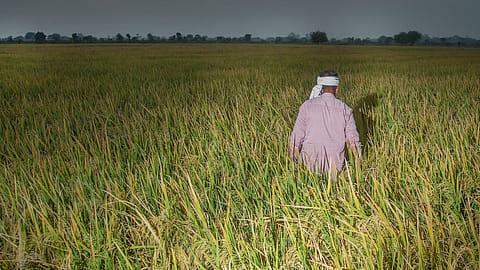Cabinet hikes MSP for kharif crops for 2022-23
Common paddy MSP has been hiked to ₹2,040 per quintal in 2022-23 from ₹1,940 per quintal in 2021-22, while paddy grade A MSP has been increased to ₹2,060 per quintal in 2022-23.

The Cabinet Committee on Economic Affairs (CCEA), chaired by Prime Minister Narendra Modi, has approved a hike in the minimum support prices (MSP) for all mandated kharif crops by up to ₹523 for marketing season 2022-23.
Common paddy MSP has been hiked to ₹2,040 per quintal in 2022-23 from ₹1,940 per quintal in 2021-22, while paddy grade A MSP has been increased to ₹2,060 per quintal in 2022-23.
Similarly, jowar hybrid and jowar maldandi MSP have been hiked by ₹232 per quintal to ₹2,970 and ₹2,990, respectively. Bajra, Ragi, Maize MSPs have been hiked by ₹100, ₹201, and ₹92 per quintal, respectively, to ₹2,350, Rs 3,578 and ₹3,578 per quintal, respectively.
Urad (₹300), Groundnut (₹300), sunflower seed (₹385), soyabean (yellow) (₹350), sesamum (₹523), nigerseed (₹375), cotton (medium staple) (₹354) and cotton long-staple (₹355) -- all have seen hikes in MSP prices for 2022-23.
The Ministry of Agriculture & Farmers Welfare says the MSP for paddy has increased from ₹1,360 per quintal in 2014-15 to ₹2,040 per quintal in 2022-23.
Similarly, MSP for maize has risen from ₹1,310 per quintal in 2014-15 to ₹1,962 per quintal in 2022-23. MSP for major oil seeds like groundnut, sunflower seed and soybean rose from ₹4,000 to ₹5,850; ₹3,750 to ₹6,400; and ₹2,560 to ₹4,300 per quintal during the said period. The minimum support price for cotton has increased from ₹3,750 in 2014-15 to ₹6,080 per quintal in 2022-23.
“The government has increased the MSP of kharif crops for 2022-23 to ensure remunerative prices to the growers for their produce and to encourage crop diversification, as provided in the table below,” says the ministry.
Recommended Stories
The increase in MSP for kharif crops is in line with the Union Budget 2018-19 announcement of fixing the MSP at a level of at least 50% over the All-India weighted average cost of production.
The return over MSP for bajra, tur, urad sunflower seed, soybean and groundnut is more than 50% over the all-India weighted average cost of production at 85%, 60%, 59%, 56%, 53% and 51%, respectively, the ministry informs.
It says efforts have been made over the last few years to realign the MSP in favour of oilseeds, pulses and coarse cereals to encourage farmers to shift larger areas under these crops and adopt the best technologies and farm practices, to correct the demand-supply imbalance.
As per 3rd Advance Estimates for 2021-22, the production of foodgrains in the country is estimated at a record 314.51 million tonnes, which is higher by 3.77 million tonnes than the production of foodgrain during 2020-21.
(INR CR)
The production during 2021-22 is higher by 23.80 million tonnes than the previous five years’ (2016-17 to 2020-21) average production of foodgrains, says the ministry.